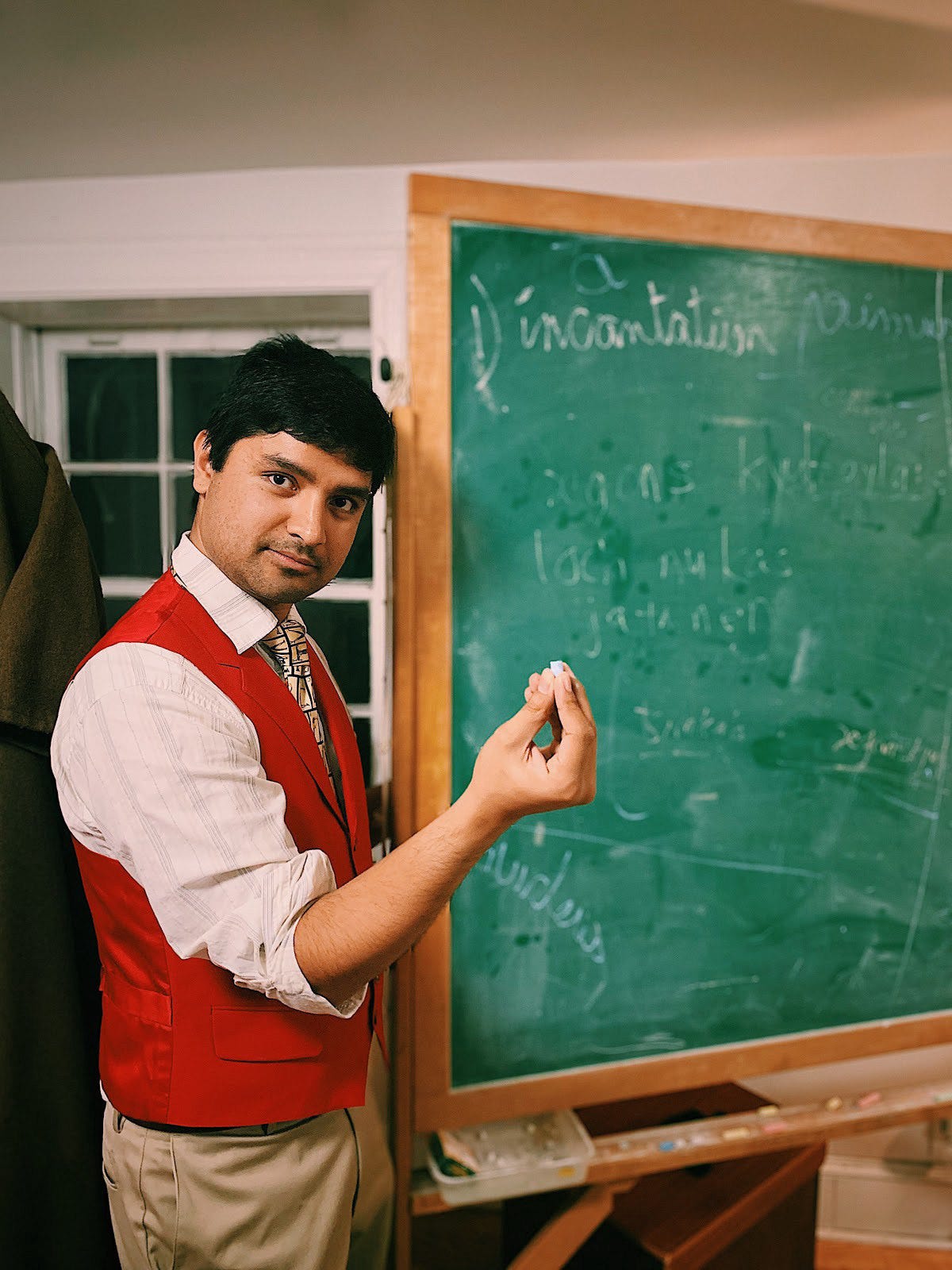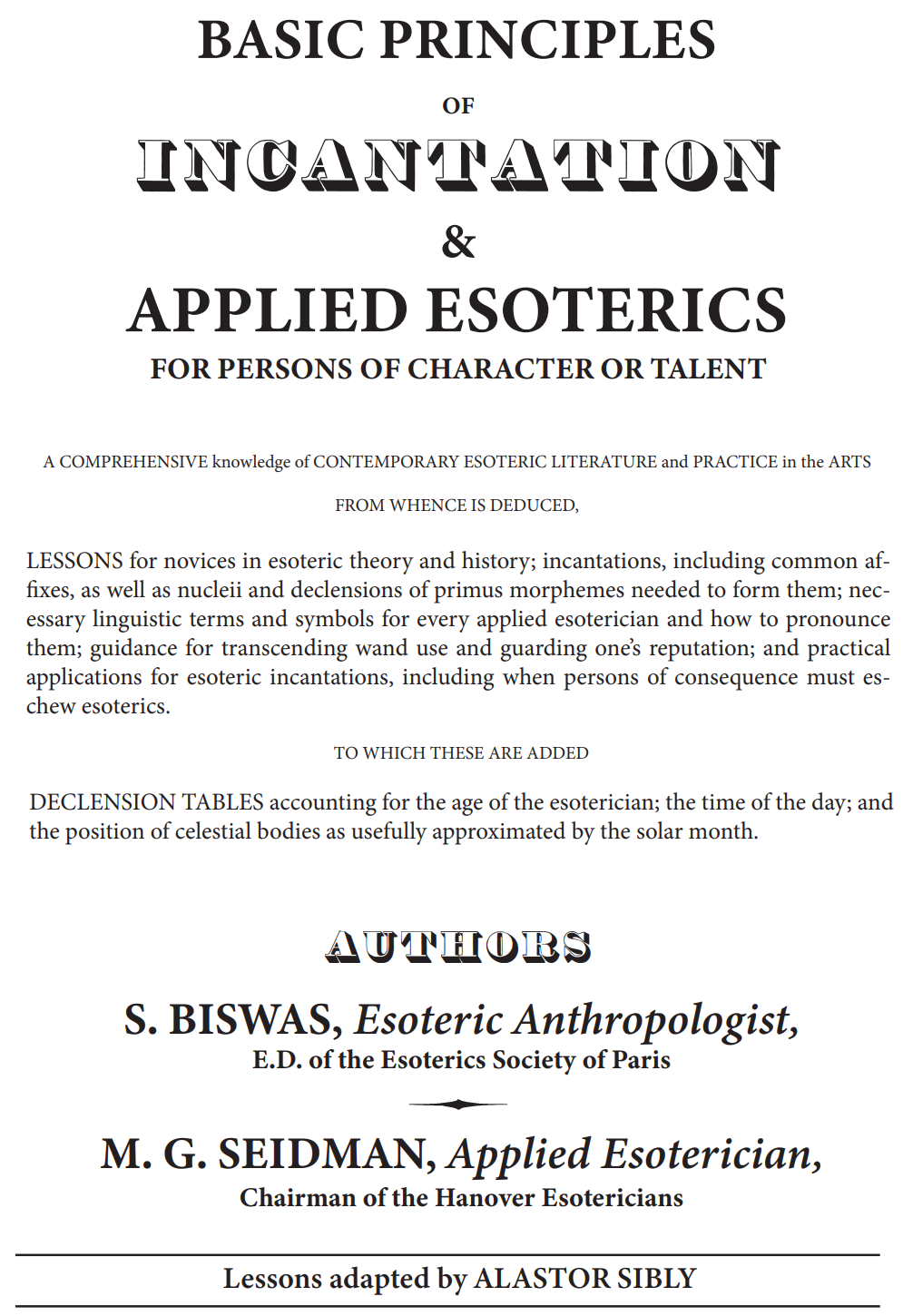‘Basic Principles of Magick’ Is A Lesson Against Cramming (Review)
The wizard school-inspired LARP falters in its digital adaptation


Magic is a tricky subject. Everyone has their own take on how it works and what it takes to master it. There are those who think it requires seven years of studying at Hogwarts. Then there are Hellblazers like me who think any bloke can learn magic but at a high cost with great personal risk. But either way, there’s always one constant, one shared element present in every theory of magic mastery: language. Casting spells always involves a structured flow of words and sounds. And it’s when every consonant and vowel perfectly rolls off a mage’s tongue that real magic happens.
It’s this verbal mastery of the mystic arts that’s the centerpiece of Mirror World Creations’ Basic Principles of Magick, an adaptation of the face-to-face LARP Basic Principles of Incantation. In this highly original one-shot LARP, audience members are taught how to cast spells by an instructor through several short lessons. While Magick’s premise is truly fun and unique, the class feels less magical and more like a remedial grammar school class.
Before attending Magick, I light several candles I own adorned with pentagrams. The scents of clove, cinnamon, and honeysuckle fill the room (to perform magic without candles is blasphemy, in my opinion). I select my digital background to be that of Dr. Strange’s Seal of the Vishanti skylight to keep evil spirits out of my personal Sanctum Sanctorum. The mood is set. I’m ready to go to wizard school.
(Minor spoilers follow.)

I open up Zoom and join the other audience members in going through the onboarding process. When the audience is ready, Magick’s co-creator Sharang Biswas changes his name in Zoom to “Professor A. Sibly.” We’re encouraged to change our names, too. Someone beats me to “Dr. Strange.” While my lack of speed is unfortunate, it allows me to pick my preferred mage “John Constantine,” instead. If I can’t be the movie star hero, I’ll be the cigarette-smoking bad boy in the back row of class. Class is now in session.
Our audience consists of eight eager mages looking to get their start in magic. Under Sibly’s guidance, taking place over several lessons, he teaches us the basic sentence structure of spells along with how to properly pronounce everything. Once armed with the basic principles, Silby springs a pop quiz on the class, forcing the students to work together in solving it.
Get Patrick B. McLean’s stories in your inbox
Join Medium for free to get updates from this writer.
SubscribeSubscribe
Don’t get me wrong. I absolutely love Magick’s plot and the conceptual ideas at work. There’s an impressive level of thought and attention to detail at work in Magick, primarily thanks to Biswas and his co-creator and co-star Max Seidman. They’ve created a whole new language from scratch for this world, which is no small feat for sure. While it’s a dense 28 pages, there’s an actual textbook for the class; the book is wonderfully designed and laid out to resemble an academic text full of spells. And it looks and reads like it was printed in the late 1800s. Additionally, Biswas delivers an amazing performance: he’s witty and his improvised jokes land perfectly, keeping me laughing out loud the entire time.
As for the experience itself, the best example of Magick’s ingenious nature is the pop quiz mechanic. The quiz is actually an oral word puzzle that the class has to deconstruct and solve collaboratively (and the specifics of the puzzle change between performances). See, one of Zoom’s main purposes is to allow people to easily communicate verbally across distances. Yet, too few experiences put any emphasis on that aspect, or truly use it to their advantage. With Biswas and Seidman making the thematic elements of Magick revolve around language, Zoom’s inherent advantage becomes Magick’s as well. There’s no awkward prompts for audience interaction. I’m in a natural, free-flowing dialogue with my classmates and Sibly that builds to this clever take on of an online puzzle. Rather than being obsessed with trying to recreate real life experiences in Zoom, Magick creates a Zoom-worthy experience by taking advantage of its inherent strengths.

But while Magick has made the most of Zoom’s advantages, none are provided to the audience in accessing Magick’s spellcasting language. If you’re hoping to learn Harry Potter-like one-word, one-syllable spells, you’ve come to the wrong place. Magick’s language is hard. Imagine Latin, but supercharged with aspects of multiple other languages thrown in for good measure. There’s even a three-part sentence structure that can be changed to create different effects when casting a spell.
It’s a ton to take in. Too much to learn, in fact. The class is only given an hour to learn all the rules and sounds to this language before the pop quiz puzzle (roughly 30 minutes is allowed to solve the puzzle). Sibly makes a valiant effort to work with each student and provide feedback throughout class. But there isn’t enough time to ensure each student can properly spellcast. I can’t get my tongue around the words. Sibly kindly asks me if I want to try the latest term in front of the whole class. I fail. I’m nowhere close. Sibly smiles and provides guidance but has to move on to another student. I’m not the only person he has to coach. I’ve clearly fallen behind. Worse, I can’t catch up. Soon, every time the class has a chance to try practicing another phrase out loud, all I can think is Please Professor, don’t pick me.
Since there’s no time for hand-holding, Sibly ends up teaching to the two smartest students in the class rather than the other six of us. Thank God these two did catch on pretty quickly, because there’d be no way to pass the pop quiz otherwise. I contribute zero ideas to solving it. I’ve been stuck on page 12 in the textbook for most of class. Not only did it feel like I was cheating to pass this pop quiz but I also felt like I failed at the same time; I walked out of class thinking magic really is impossible to master.
While I love the originality of Basic Principles of Magick’s concept, I wished I felt the same way about experiencing it. I don’t know if the solution is that Magick needs to have a longer run time, or to have fewer people in the class allowing for more one-on-one time with Sibly, to revise the language to make it more accessible or easier to understand, or to simplify the pop quiz. But what I do know is that if Mirror World Creations keep working at improving the experience, they’ll truly have something magical on their hands. Or, rather, their tongues, that is.
Basic Principles Of Magick runs on November 9 and December 7. Tickets are $25.
NoPro is a labor of love made possible by our generous Patreon backers. Join them today!
In addition to the No Proscenium web site, our podcast, and our newsletters, you can find NoPro on Twitter, Facebook, YouTube, Instagram, in the Facebook community Everything Immersive, and on our Slack forum.
Office facilities provided by Thymele Arts, in Los Angeles, CA.